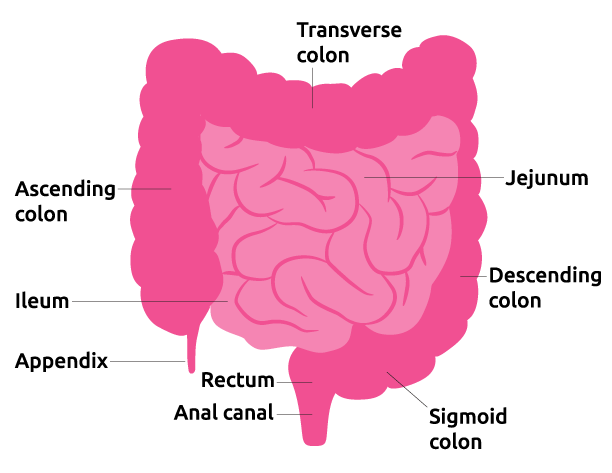Intestine – OPTN
Intestine
The intestine
Functions of the Intestine
The intestines are part of the alimentary tract. This tract extends from the upper esophagus through the stomach, small bowel, and colon, and ends at the anus. Intestinal organs support life by digesting food, absorbing nutrients, and ridding the body of waste.
Intestinal organs may not function properly for a number of reasons, including:
- Metabolic or immune system diseases
- Loss of blood flow to the organs
- Severe infection
- Damage from diseases of other organs such as the liver or kidneys
The most common condition leading to an intestinal transplant is short gut syndrome. This happens when there is not enough small intestine to digest food normally. It can happen at birth. It can also be caused by other diseases and/or surgical removal of part of the intestine.
Intestine transplant procedures
An intestinal organ transplant may include the entire gastrointestinal tract from esophagus to large intestine, or it may be any portion. Other organs may also be transplanted along with intestinal organs. The primary types of transplants include:
- Small bowel alone
- Liver and small bowel
- Multivisceral transplantation including the stomach and small bowel, sometimes including the colon and/or other organs such as liver and pancreas
Intestine transplants almost always involve a deceased donor. In very rare instances, a living donor has provided a segment of intestine for transplantation.
Reasons for intestine transplants
| Intestine diagnosis |
|---|
| Short Gut Syndrome: Intestinal Atresia |
| Short Gut Syndrome: Necrotizing Enterocolitis |
| Short Gut Syndrome: Intestinal Volvulus Secondary to Malrotation |
| Short Gut Syndrome: Intestinal Volvulus Secondary to Adhesions |
| Short Gut Syndrome: Intestinal Volvulus Secondary to Persistent Omphalomesenteric Duct |
| Short Gut Syndrome: Gastroschisis |
| Short Gut Syndrome: Massive Resection Secondary to Inflammatory Bowel Disease (Crohn’s Disease) |
| Short Gut Syndrome: Massive Resection Secondary to Tumor |
| Short Gut Syndrome: Massive Resection Secondary to Mesenteric Arterial Thrombosis or Embolus |
| Short Gut Syndrome: Massive Resection Secondary to Mesenteric Venous Thrombosis |
| Short Gut Syndrome: Specify |
| Short Gut Syndrome: Unspecified |
| Functional Bowel Problem: Hirschsprung’s Disease |
| Functional Bowel Problem: Neuronal Intestinal Dysplasia |
| Functional Bowel Problem: Pseudo-obstruction, Neuropathic |
| Functional Bowel Problem: Pseudo-obstruction, Myopathic |
| Functional Bowel Problem: Protein-losing Enteropathy |
| Functional Bowel Problem: Microvillous Inclusion Disease |
| Functional Bowel Problem: Specify |
| Functional Bowel Problem: Unspecified |
| Graft Failure |
| Retransplant |
| Other Intestinal Disease |
You may be interested

Hulk Hogan’s son joins WWE talent to pay tribute to father
new admin - Jul 29, 2025[ad_1] NEWYou can now listen to Fox News articles! Nick Hogan, the son of pro wrestling icon Hulk Hogan, appeared…

Netgear’s new Wi-Fi 7 mesh system is its most affordable yet
new admin - Jul 29, 2025Netgear has launched the Orbi 370, the latest and most affordable addition to its Wi-Fi 7 mesh router portfolio. At…

Gunman in NYC shooting tried to target NFL offices, Mayor Eric Adams says
new admin - Jul 29, 2025The gunman behind a deadly shooting rampage inside an office building in Midtown Manhattan Monday evening was apparently targeting NFL offices there,…
































